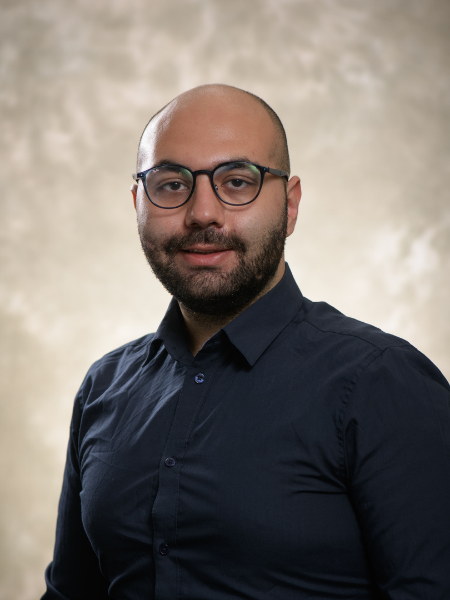Article
 Kasra Tabatabaei
Kasra TabatabaeiKasra Tabatabaei is currently pursuing his Ph.D. in biophysics and quantitative biology at the University of Illinois Urbana-Champaign. At the Beckman Institute, his primary research theme is Molecular Design and Engineering and he regularly collaborates with researchers in the Charles Schroeder lab. His research focuses on data storage for DNA-based molecules.
Hometown: Shahreza, Isfahan, Iran
When did you first take an interest in your field?
I was very interested in this field ever since I heard about it. When I was a senior during my undergraduate years, I used to do writing for a scientific magazine. I came across a paper about DNA-based data storage systems and decided to cover it. After reading it. I became interested in the topic immediately. At the same time, I was applying for grad schools as well and I found that there is a group at the University of Illinois that works on DNA-based data storage. I applied for a graduate student position and was grateful to get in.
What kind of research are you working on?
My current work is mainly focused on DNA-based data storage systems. Today’s data storage platforms are mostly based on silicon. But we may run out of microchip-grade silicon soon and need to think about alternative ways to store our information. DNA is a very special molecule; it is a super dense and stable polymer and can be copied easily with machinery that nature has already provided us. That’s why it has the potential to become a future medium for recording information. What we do is convert binary information to the DNA alphabet (A,T,C, and G) and synthesize DNA molecules based on that sequence. To read the data we can use various DNA sequencing technologies.
How does your research apply to the real world? What are the social causes it benefits?
Data storage is a challenge today. Zettabytes (Zetta is ten to the twenty-first power) of data are generated every year, and storing this amount of information using the current technologies is costly and energy-consuming. We think DNA can become a cheaper and more environment-friendly medium, at least for storing archival data. Millions of gigabytes can be stored in only grams of DNA.
How has Beckman Institute helped you as a scientist, professional, and person?
Beckman is designed for scientists to get to know and interact with each other and I find that very important. Today, you can’t be a biologist without having interactions with chemists and physicists and using their knowledge for your research goals. Beckman has provided us the opportunity to meet people from different fields and different perspectives. This reciprocal interaction has definitely played a role in shaping my scientific mindset.
Describe a transformative moment or experience you have had at Beckman.
I initially started working in another building on campus; I didn’t start working at Beckman until 2019. The moment we entered, I noticed that the building and the environment here is designed for people to interact with each other and sit and have conversations. My research is interdisciplinary by nature. I most appreciate the opportunity to see people from different backgrounds and have conversations with them, learn from them, and find solutions to my problems.
Tell us about your post-university plans!
I am starting a job as a postdoctoral fellow position at New England Biolabs, or NEB.
What do you like to do outside of the classroom or lab?
I enjoy reading, playing and listening to music, working out, and watching movies.
What do you consider your greatest achievement?
That I have the chance to work on something that I really like and also be successful in it.
Speed Round
Favorite local restaurant: Huaraches Moroleon
Top three songs at the moment: "Wolves," by Phosphorescent; "The Man Who Sold The World," Nirvana; "Kanata," MONO
Something you did over spring break: Preparing for my defense!
Favorite warm-weather activity: Camping
Currently streaming/watching: After Life on Netflix
Beckman Institute for Advanced Science and Technology